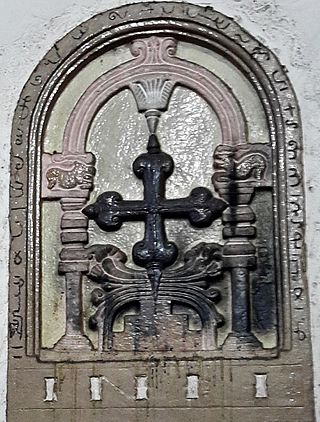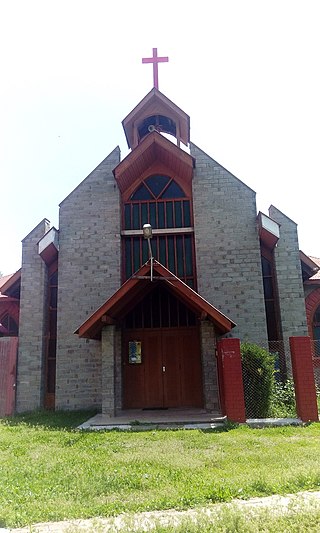The Three-Self Patriotic Movement is the official government supervisory organ for Protestantism in the People's Republic of China. It is colloquially known as the Three-Self Church.
A Christian mission is an organized effort for the propagation of the Christian faith. Missions involve sending individuals and groups across boundaries, most commonly geographical boundaries, to carry on evangelism or other activities, such as educational or hospital work. Sometimes individuals are sent and are called missionaries, and historically may have been based in mission stations. When groups are sent, they are often called mission teams and they do mission trips. There are a few different kinds of mission trips: short-term, long-term, relational and those that simply help people in need. Some people choose to dedicate their whole lives to mission. Missionaries preach the Christian faith, and provide humanitarian aid. Christian doctrines permit the provision of aid without requiring religious conversion. However, Christian missionaries are implicated in the genocide of indigenous peoples. Around 100,000 native people in California, U.S., or 1/3 of the native population, are said to have died due to missions.
The term Dalit Christian or Christian Dalit is used to describe those who have converted to Christianity from other forms of religion in the Indian subcontinent, and are still categorised as Dalits in Hindu, Christian, Muslim, and Sikh societies in South Asia. Hindu Dalits are sometimes referred to as Harijans. About 90% of Pakistani Christians are Dalits from the Chuhra caste and at least 9% of Indian Christians are Dalits, categorised thus by the greater societal practices in various parts of the Indian subcontinent.

The United Presbyterian Church of North America (UPCNA) was an American Presbyterian denomination that existed for one hundred years. It was formed on May 26, 1858 by the union of the Northern branch of the Associate Reformed Presbyterian Church with the Associate Presbyterian Church (Seceders) at a convention at the Old City Hall in Pittsburgh. On May 28, 1958, it merged with the Presbyterian Church in the United States of America (PCUSA) at a conference in Pittsburgh to form the United Presbyterian Church in the United States of America (UPCUSA).

Christianity is India's third-largest religion with about 26 million adherents, making up 2.3 percent of the population as of the 2011 census. The written records of the Saint Thomas Christians state that Christianity was introduced in the Indian subcontinent by Thomas the Apostle, who sailed to the Malabar region in the present-day Kerala state in 52 AD.

Forman Christian College is a Private not-for-profit university liberal arts university in Lahore, Punjab, Pakistan. It was founded in 1864 and is administered by the Presbyterian Church. The university follows an American-style curriculum.

Christianity is the third largest religion in Pakistan, making up about 1.27% of the population according to the 2017 Census. Of these, approximately half are Catholic and half Protestant. A small number of Eastern Orthodox Christians, and Oriental Orthodox Christians also live in Pakistan.

The Catholic Church in India is part of the worldwide Catholic Church under the leadership of the Pope. There are over 20 million Catholics in India, representing around 1.55% of the total population, and the Catholic Church is the single largest Christian church in India. There are 10,701 parishes that make up 174 dioceses and eparchies, which are organised into 29 ecclesiastical provinces. Of these, 132 dioceses are of the Latin Church, 31 of the Syro-Malabar Catholic Church & 11 of the Syro-Malankara Catholic Church. Despite the very small population that Indian Catholics make up percentage wise, India still has the second-largest Christian population in Asia after the Catholic Church in the Philippines.

The Catholic Church in Pakistan is part of the worldwide Catholic Church, under the spiritual leadership of the pope in Rome.
Protestants in India are a minority and a sub-section of Christians in India and also to a certain extent the Christians in Pakistan before the Partition of India, that adhere to some or all of the doctrines of Protestantism. Protestants in India are a small minority in a predominantly Hindu majority country, but form majorities in the north-eastern states of Meghalaya, Mizoram& Nagaland and significant minorities in Konkan division, Bengal, Kerala& Tamil Nadu, with various communities in east coast and northern states. Protestants today trace their heritage back to the Protestant reformation of the 16th century.
The Presbyterian Church of Pakistan is the largest Presbyterian, Reformed denominations is the second largest Protestants in Pakistan. It was formed in 1993 by the merger of United Presbyterian Church of Pakistan (1855-1993) and Council of Churches of Lahore.
The United Presbyterian Church of Pakistan is the second-largest Presbyterian, Reformed denominations and the third-largest Protestant denomination in Pakistan. It was formed in 1968 by churches that split from the United Presbyterian Church of Pakistan (1855-1993).
Christians form 1.3% of the total population numbering around 3.5 lakhs in Punjab, India as per as 2011 census. But according to many media reports, demographic experts and Christian groups, there may be as many 1.94-2.77 million Christians living in Punjab, constituting up to (7%-15%) of the state population, the authenticity of that claim is still not known. and many converts to Christianity keep their original identity to enjoy the benefits of reservation. John Lowrie and William Reed were missionaries who went there in 1834. The Diocese of Amritsar of the Church of North India has its seat in Punjab as does the Roman Catholic diocese of Jalandhar. There are thousands of settlements with a Christian congregation. From 1881 to 1891 the Christian population of the then still united Punjab increased rapidly.
Christianity is the second largest religion in Punjab Province of Pakistan comprising 2.3% of its population. Most Christians (81%) of Pakistan live in Punjab province. There are 2,068,233 Christians in Punjab province as of 2017, up from 1,699,843 in 1998.
The All India Catholic Union (AICU) represents almost 16 million Catholics in India: followers of the Latin Rite, the Syro-Malabar Catholics and the Syro-Malankara Catholics. It has 120 diocese and district units. The AICU was established in 1930.
Surendra Kumar Datta (1878–1942), also spelt as Surendra Kumar Dutta or S. K. Dutta, was the president of the All India Conference of Indian Christians and thus the Indian Christian delegate to the Second Round Table Conference in London, as well as a prominent YMCA leader, and a member of Central Legislative Assembly – also called Imperial Legislative Assembly before Indian independence – a lower house of a bicameral parliament synonymous to the current Lok Sabha after Indian independence.

St. Joseph's Catholic Church is a parish of the Roman Catholic Church in Baramulla, Jammu and Kashmir, India. It was established in 1891, by the Mill Hill Missionaries, making it the oldest Catholic church in Jammu and Kashmir, and currently belongs to the Jammu Srinagar Diocese. St. Joseph's Church, St. Joseph's Hospital and St. Joseph's School are located on the same campus as the parish church. It is the only church in the town, and there are only few Christian families in the community.

Punjabi Christians are adherents of Christianity who identify linguistically, culturally, and genealogically as Punjabis. They are mainly found in the Pakistani province of Punjab, forming the largest religious minority. They are one of the four main ethnoreligious communities of the Punjab region with the others being Muslims, Sikhs and Hindus. Punjabi Christians are traditionally divided into various castes, and are largely descendants of Hindus who converted to Christianity during the British Raj in colonial India.
The All India Conference of Indian Christians (AICIC) is an ecumenical organisation founded in 1914 to represent the interests of Christians in India. It was founded to advocate for the moral, economic, and intellectual development of the Indian Christian community. The All India Conference of Indian Christians held its first meeting on 28 December 1914 and was led by Raja Sir Harnam Singh of Kapurthala, who was the president of the National Missionary Society (NMS); the first AICIC General Secretary was B. L. Rallia Ram of Lahore. Its creation united local and regional Indian Christian Associations, which existed in Bombay, Madras, Hyderabad, Punjab, United Provinces, Bengal and Burma, under one umbrella organisation. At the time of the Indian independence movement, the organisation allied itself with the Indian National Congress and the resolutions passed by All India Conference of Indian Christians advocated communal harmony, while also pressing for the rights of Christians in both colonial India and independent India. The India Conference of Indian Christians advocated for self-rule in a united and independent country, opposing the partition of India. During the era of the British Raj in India, the AICIC served as the mouthpiece for members of the Indian Christian community, conducting membership drives to boost its base, which included Protestant and Catholic Christians. As such, the presidents of the AICIC represented the Christians of undivided India at the Round Table Conferences.
For the current denomination, founded in 1968, dissenting from this, see United Presbyterian Church of Pakistan









